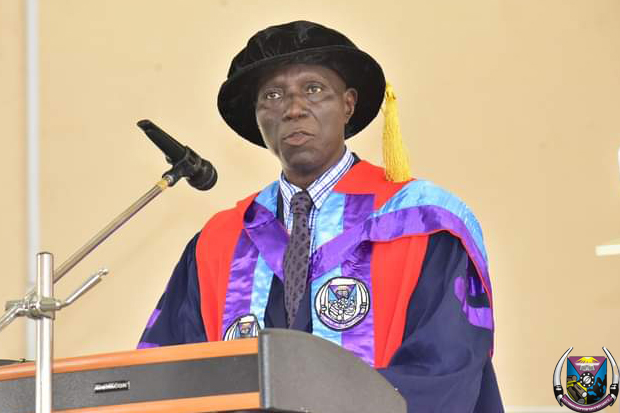

A Professor of Agricultural Biochemistry and Nutrition (Ruminants Nutrition), Adebowale Fajemisin, has advocated a deliberate effort to permanently solve the incessant farmers-herders clashes, conversion of agro wastes to animal feed and adoption of new strategies for improved livestock production and inclusive growth in development efforts through participation of stakeholders as sure ways of achieving sustainable agricultural production and food security in the country. He stated this while delivering the 161st inaugural lecture of the Federal University of Technology, Akure on Tuesday 7th November, 2023.
Professor Fajemisin who spoke on the topic, “Farmers-Herders Conflicts: Undervalued Resources and Small Ruminants as Panacea,” said the solution to farmers-herdsmen conflicts rests squarely on the shoulders of government coupled with promotion of affordable production of animal protein. The don urged the government to put in place conflict resolution policies such as setting up of ranches for the herdsmen, and resolving ethnic conflicts among and within groups in the country with a view to encouraging livestock production. He advised that, “for profitable animal production, it is necessary that most agro wastes should not be allowed to rot away, but be used in feed formulations for animals.”
Giving a statistics of Nigerian population currently starving he said “over 60% of Nigerians are starving and need nutritious food.” According to him there is no reason for Nigerians to starve, given the abundant resources at our disposal. He listed the undervalued resources especially in agricultural production to include uncultivable land (waste land, dry land, housing sites), stagnant water and some livestock feeds, saying limited supply of quality feed is the most important factor militating against livestock productivity in many sub-Saharan African countries. He however said “having a systematic inventory of available feed resources and identifying main challenges and potentials for improvement is the first step towards designing development strategies to improve feed quality and quantity.”
The don, passionate about food sustainability in the country, especially animal protein said “there is a need to work towards improving ways by which we can produce food sustainability and in particular, animal protein in this country at affordable prices. Nigeria is blessed with many bio-resources which can be harnessed for use as feed resources in animal nutrition. Thus, for profitable animal production, it is necessary that most agro-wastes should not be allowed to rot away, but be used in feed formulations for animals, particularly the ruminants reared under intensive system. This may not be without subjecting them to appropriate biotechnological processing to improve their nutritional qualities.”
On how to improve and increase animal production, the don recommended a transformation of ruminant farming from subsistence to agribusiness, adding that ruminants’ farmers must see animal agriculture as business where appropriate agribusiness models for smallholders and commercial ruminants’ farmers must strive. He said farmers’ association should complement the effort of the government by providing financial support to research in the country, in addition to undergoing and adopting regular training in new innovations for livestock farming, adding that farmers should always bring nutritionally related challenges to the doors of the nutritionists who are vast in ruminant nutritional studies with a view to gaining knowledge about the findings and innovations in pasture production and use of crop residues.
Assessing the quality of livestock in Nigeria, the don said “it is a known fact that cattle, sheep and goats domesticated in Nigeria possess poor genetic makeup. This is judged by their poor performance and low meat yield, which culminates in low productivity and low resilience. Consequently, the government should establish breeding institutes that would help in training breeders, with a view to developing our local breeds that are genetically fit for our environment. Thus, feed efficiency, disease resistant and heat tolerant breeds should be the focus of the breeders.”
Professor Fajemisin who currently is the Head, Department of Animal Production and Health (APH), said that most research breakthroughs from the Universities and Research Institutes are not accessible to farmers making such efforts wasted. He therefore recommended that the extension units of every state government within the country should be made alive to the responsibilities of taking up the challenge of transmitting research findings to farmers. By this act, new findings will be made accessible to the farmers. He added that government should as a matter of urgency set aside substantial fund, which can be accessed for Research and Development (R & D) in agriculture. He also recommended curriculum overhauling saying “the curriculum must be improved upon in its present state to accommodate enormous practical and modern agriculture, based on the use of results derived from technological studies.”
Dwelling on the established commercial farm of the university, the lecturer said “the newly established commercial farm of the university should be all encompassing in function, exploring all avenues to ensure that most food related problems of the public are resolved, while making profit and giving room for research and training of staff and students.” He added that in the cause of production, technology that is indigenous to our environment and centered on improving the efficiency of smallholders’ farmers vis-à-vis enhancement of sustainable production should be identified and developed. According to him, such appropriate innovation and technology will be impact-oriented.
The don further recommended appropriate marketing of livestock produce. He said “the present system of marketing livestock in the country will not allow government to benefit enough in terms of internally generated revenue. Developing a thriving crop/livestock industry that will be a major contributor to the nation’s Gross Domestic Product will capture a reasonable percentage of huge food crops, meat and dairy products market. This might require using a Public Private Partnership (PPP) approach and leveraging on support from all sources, both at national and international levels.”
Presenting the lecturer to the audience, the Vice Chancellor and Chairman at the event, Professor Adenike Oladiji described him as an erudite scholar who has contributed immensely to the development of the university through knowledge sharing, teaching, research and community development.